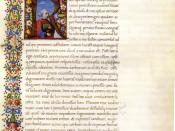Anthony Grubb
AP Euro - 3B
Mrs. Beck
9/21/14
Did Women Have a Renaissance?
In the most blatant sense, men held all power and influence during the Renaissance. As a result of this imbalance, very few women had roles to uphold in the community. During the eleventh and twelfth centuries, women were provided with much more economic and political power than would be allowed for during the Renaissance period. It is argued that, due to this lack of power, the term "Renaissance" does not necessarily apply to women; that it was a title that had been given to them afterwards. They were generally not given the same opportunities as men, and lost many of their privileges, socially and culturally. However, women did, in fact, have a Renaissance.
During such a period of diverse interaction and studies, it would only be logical that women advanced in the field. As seen in Document 1 by an unknown contemporary, women proved that they were intelligent and were competent enough to hold political power.
This author's point of view, being a subject and possibly a friend herself, reflects that Queen Elizabeth was loved and feared due to her regard for her subjects, as well as her authority over them. Another example would be the point of view of Laura Quirini, a Venetian patrician. In Document 5, she describes how a certain woman, Isotta Nogarola, overcame the gender barrier, and applied herself to higher disciplines and education in society. In Document 6, by Leonardo Bruni, the author's point of view places heavy emphasis on intellect, as Bruni is a humanist. He realizes what women have had to go through daily, in order to survive socially, and tries to offer his views and encouragement for them.
Document 7 offers another perspective on the topic.
![English: Domenico Ghirlandaio: Zachariah in the Temple [detail]: Marsilio Ficino, Cristoforo Landino, Angelo Poliziano and Demetrios Chalkondyles (detail). Fresco. Santa Maria Novella, Cappella Tornabuoni, Florence, Italy. 1486-1490.](https://s.writework.com/uploads/18/189664/english-domenico-ghirlandaio-zachariah-temple-detail-marsili-thumb.jpg)

